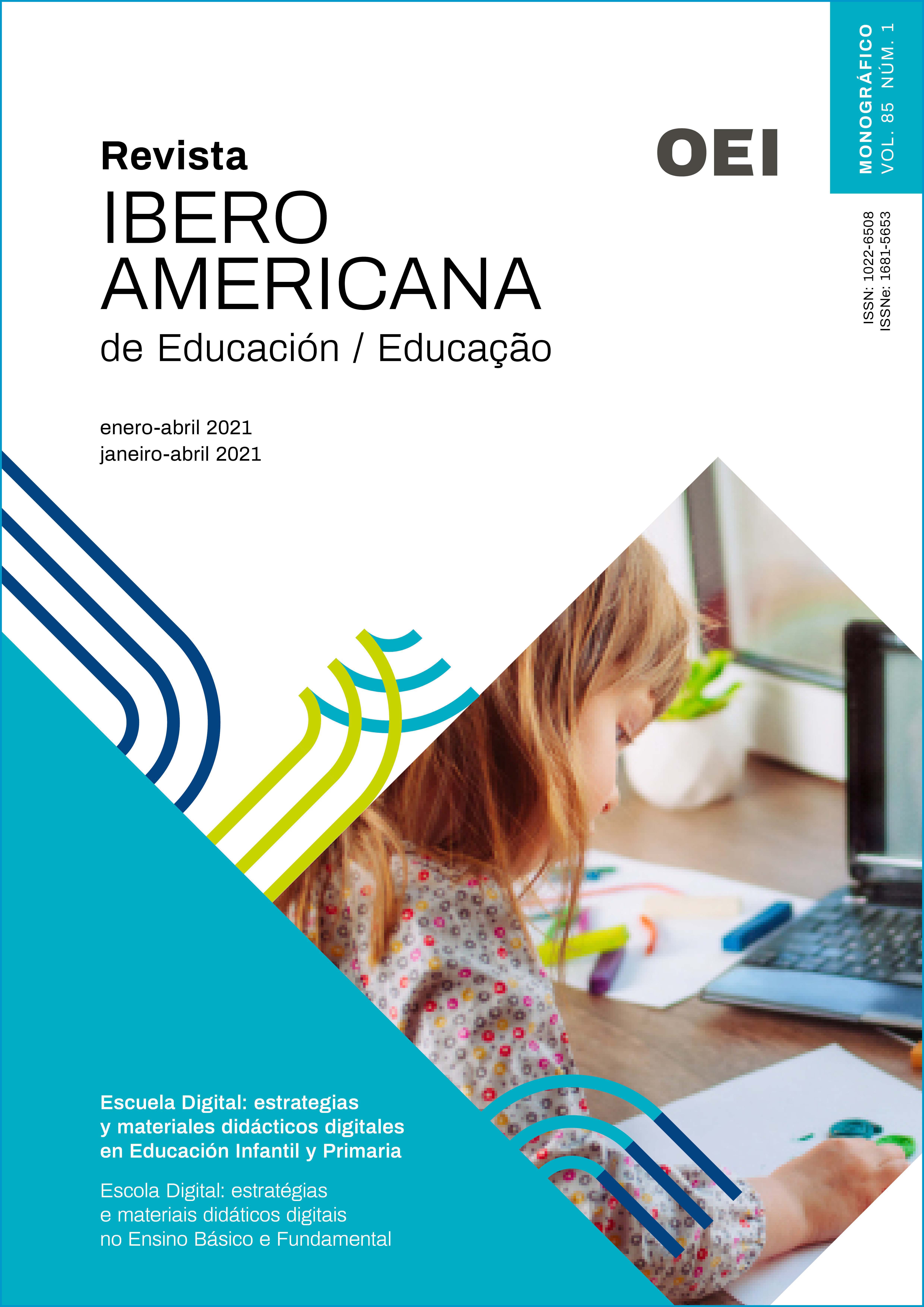Planning distance learning: pedagogical-curricular options for the 1st Cycle
DOI:
https://doi.org/10.35362/rie8514057Keywords:
1st cycle of Basic Education; curriculum; planning; distance learningAbstract
The year 2020 is being marked by a pandemic situation, which brought the reorganization of multiple social activities, namely the educational processes. In Portugal, schools and other educational establishments were closed, and the pedagogical activity continued in a distance learning modality. Teachers and further educational agents had to restructure the already planned dynamics for the promotion of the student’s learning. The publishers of school textbooks created different digital didactic materials that could facilitate the professional action of teachers, with highlights to the plans for the various coming weeks of classes. In fact, the influence of such organizations in the pedagogical practices is, nowadays, undeniable. Thus, the empirical corpus taken here was a set of 16 weekly class plans, with focus on their pedagogical and curricular potentialities for distance learning in the 1st cycle of Basic Education, which were made available by two Portuguese publishers, and to which it was possible to access digitally, for free. Partly, these resources suggest a pedagogical work somewhat divergent from an idea of integrated curriculum, marked by the passivity in learning and by the depreciation of the evaluation. However, in a virtually unprecedented situation, the same are a testimony of another relevant (technological).
Downloads
References
Alonso, L. (2002). Para uma teoria compreensiva sobre a integração curricular: o contributo do Projecto “PROCUR”. Revista do GEDEI, 62-88.
Aoki, T.T. (2004). Curriculum in a new key: the collected works of Ted T. Aoki. (W.F. Pinar & R.L. Irwin, Eds.). New Jersey: Lawrence Erlbaum Associates.
Apple, M.W. (1989). Textbook Publishing: The Political and Economic Influences. Theory into Practice, 28(4), 282-287.
Bardin, L. (2011). Análise de conteúdo. São Paulo: Edições 70.
Clemente Linuesa, M. (2012). Diseñar el currículum: prever y representar la acción. En Diseño, desarrollo e innovación del currículum (2.ª ed., pp. 13-24). Madrid: Morata.
Cohen, L., Manion, L. & Morrison, K. (2018). Research Methods in Education (8.ª ed.). Oxon: Routledge.
Decreto-Lei n.º 55/2018, de 6 de julho do Ministério da Educação. Diário da República: I série, N.º 129 (2018). Disponível em https://bit.ly/3qIZtUC.
Dias de Carvalho, A. (2002). Epistemologia das Ciências da Educação (4.ª ed.). Porto: Edições Afrontamento.
Diogo, F. (2010). Desenvolvimento Curricular. Luanda: Plural Editores.
Doll Jr., W.E. (1989). Foundations for a post-modern curriculum. Journal of Curriculum Studies, 21(3), 243-253. https://doi.org/10.1080/0022027890210304.
Flick, U. (2015). El diseño de la investigación cualitativa. Madrid: Morata.
Gimeno Sacristán, J. (2013). O que significa currículo? En J. Gimeno Sacristán (Org.), Saberes e Incertezas sobre o Currículo (pp. 16-35). Porto Alegre: Penso Editora.
Gimeno Sacristán, J. (2015). El currículum como estudio del contenido de la enseñanza. En J. Gimeno Sacristán (Coord.), Ensayos sobre el currículum: teoría y práctica (pp. 29-62). Madrid: Morata.
Gobby, B. (2017). What is curriculum? En B. Gobby & R. Walker (Eds.), Powers of curriculum: sociological perspectives on education (pp. 5-34). South Melbourne: Oxford University Press.
Kelly, A.V. (2004). The Curriculum (5.ª ed.). London: SAGE Publications.
McMillan, J. & Schumacher, S. (2014). Research in Education: Evidence-Based Inquiry (7.ª ed.). Harlow: Pearson Education Limited.
Moreira, A.I. & Duarte, P. (2019a). A planificação na formação inicial e professores: um retrato a partir dos contributos da educação histórica. Indagatio Didactica, 11(4), 41-60.
Moreira, A.I. & Duarte, P. (2019b). “As professoras escrevem muito!”: representações de estudantes do 1.º Ciclo sobre a docência. En P. Duarte, A.I. Moreira, F.L. Diogo, D.M. Fernandes, D.A. Ribeiro, J.A. Costa, & M.B. Canha (Orgs.), O 1.º Ciclo do Ensino Básico: que identidade(s)? (pp. 11-27). Porto: Escola Superior de Educação do Politécnico do Porto.
Paraskeva, J.M. (2011). Conflicts in curriculum theory: challenging hegemonic epistemologies. New York: Palgrave Macmillan. https://doi.org/10.1057/9780230119628.
Pérez Gómez, Á.I. & Gimeno Sacristán, J. (2008). Comprender y transformar la enseñanza (12.ª ed.). Madrid: Ediciones Morata.
Roldão, M.C. (2001). Gestão Curricular: a especificidade do 1.º Ciclo. Viseu: Ministério da Educação, Departamento da Educação Básica.
Roldão, M.C. (2020). Articulação curricular e a relevância como critérido do essencial: para uma tentativa de clarificação concetual. Revista de Estudos Curriculares, 11(1), 73-85.
Rosales López, C. (2012). El Pensamiento de profesores y alumnos: cuestiones relevantes de enseñanza y aprendizaje. Santiago de Compostela: Andavira.
Stake, R. (2005). Qualitative Case Studies. En N.K. Denzin & Y.S. Lincoln (Eds.), Handbook of Qualitative Research (pp. 443-465). Thousand Oaks, London, New Delhi: Sage Publications.
Torres Santomé, J. (2015). Sin muros en las aulas: el currículum integrado. En J. Gimeno Sacristán (Coord.), Ensayos sobre el currículum: teoría y práctica (pp. 148-159). Madrid: Morata.
Viana, J. & Peralta, H. (2020). Aprender na era digital: do currículo para todos ao currículo de cada um. Revista Portuguesa de Educação, 33(1), 137-157. https://doi.org/10.21814/rpe.18500.
Yin, R.K. (2018). Case Study Research and Applications: design and methods (6.ª ed.). Los Angeles: SAGE.
Young, M. (2016). Por que o conhecimento é importante para as escolas do século XXI. Cadernos de Pesquisa, 46(159), 18-37. https://doi.org10.1590/198053143533.
How to Cite
Published
Issue
Section
License
Any authors who publish with this journal accept the following terms:















